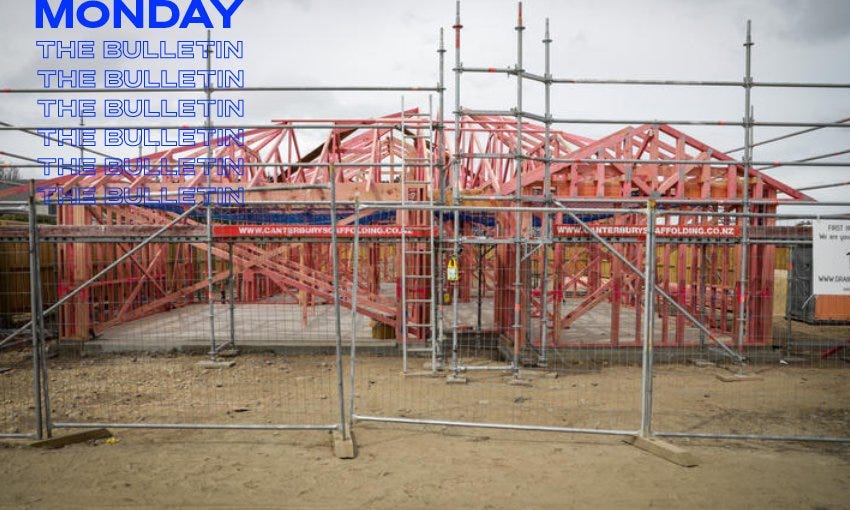Investigating the high cost of building supplies
The government is undertaking a market study into the cost of residential building materials and whether the sector lacks for competition
Mōrena and welcome to The Bulletin for Monday, November 22, by Justin Giovannetti. Presented in partnership with Z Energy.
In today’s edition: Another bad poll for National; Auckland could be entering its final week of lockdown; MIQ’s future in doubt; but first, a probe of building material costs.
The cost of building supplies is up 5.5% over the past year. (RNZ / Nate McKinnon)
Another sector of the economy will now face government scrutiny. The Commerce Commission has been given the green light to undertake a probe of the market for residential building materials, Stuff reports. After a dive into petrol prices and an ongoing investigation of supermarkets, it’s the third study in as many years that looks at what, from the outside, seems to be an unusually expensive part of New Zealand’s economy. The study of building supplies was a Labour campaign promise and the government has long harboured a suspicion that timber and GIB board is overpriced and sold by too few players – the latter point perfectly illustrated by the fact that we call it GIB board.
The building materials sector has made the case for the study. Earlier this year, Carter Holt Harvey stopped supplying wood products to Mitre 10 and ITM. The company, owned by New Zealand’s richest person, controls half the country’s structural timber trade and despite claiming shortages, kept supplying its own subsidiary, Carters. It was seen by many as a power move by the company against its competitors. As part of an investigation into high prices across New Zealand’s economy, North & South painted a damning picture of the building supplies market, where a few companies dominate the industry.
David Clark, the commerce minister, warned as much yesterday in announcing the market study. “There have been long-standing concerns about potential competition issues, particularly due to the highly concentrated nature of some markets in the supply chain”, he said.
The cost of building supplies has soared in recent years. There have been numerous stories in recent months of people buying homes off-the-plan, only for builders to come back to them looking for thousands more in unexpected costs. According to CoreLogic, construction costs increased by 5.5% over the past year due to a sharp rise in timber and cladding prices. The increases have contributed to the surge in house prices. While it’s tough for prospective homeowners, it’s also a really bad situation for contractors. OneRoof reports that there could be a wave of collapses in the building industry as small contractors struggle to finish fixed-price projects amid fast-growing costs. Some builders have already gone under in recent months and economists warn that a number of companies are only surviving off government wage subsidies in locked down areas – that funding will end in a few weeks as Auckland enters the traffic light system.
The Spinoff has a new look from today. The Spinoff has grown and changed over the past two years and the website now reflects that, after being completely overhauled. It looks absolutely fresh. The team has put in a lot of hard work to create new logos, new colours, new imagery and a new way of telling stories. I particularly like how live updates now appears on every page, so whatever story you’re reading, breaking news is there. The Spinoff’s creative director Toby Morris has written a guide to the new site.
If you’re a fan of the redesign and not a member of The Spinoff, today is a great day to change that. Click here to learn how you can support the team.
A ‘political death spiral’ for the National party. Another poll shows the official opposition is in serious trouble. The latest poll from Newshub and Reid Research has National at 26.9% as Act’s surge continues, now up to 16%. Despite what could be charitably described as a difficult delta lockdown for Labour and a muddled Covid-19 policy, the governing party is still at 42.7%. As Tova O'Brien writes, the mood is warming for a coup within National and it’s a real question whether Judith Collins can keep her office past Christmas.
Labour’s dominance might not be as strong as it appears. Jack Tame and Q+A commissioned polling that revealed the party’s support rests on shaky foundations.
The Covid numbers: There are 83 cases in hospital and 5 in ICU/HDU. There are now 4,545 active cases in New Zealand. 140 new community cases were reported in Auckland yesterday, 6 in Waikato, 3 in Northland, 2 in Bay of Plenty and 1 in Canterbury. 21,501 people were vaccinated on Saturday.
The Spinoff’s Covid data tracker has the latest figures.
Auckland enters what could be its final week of lockdown, move to level 3.3 unlikely. Cabinet isn’t expected to change the city’s alert level today, but a trial allowing some businesses to open with the use of vaccine passes is possible, the NZ Herald reports. It’s likely level 3.3 won’t be used at all. The big traffic light decision, for Auckland and the rest of New Zealand, is next Monday.
MIQ could end in February, government letter hints. While the prime minister has said changes won’t happen to managed isolation before the first quarter of 2022, Stuff reports there’s now a suggestion the border facilities might not last long beyond February. A government agency hinted to exporters that they might not need to apply for MIQ slots past that month. However, a suggestion reported by the NZ Herald last week that self-isolation could be approved before Christmas was thoroughly shot down by Jacinda Ardern, according to Newshub.
Thinking about travelling? ABC has written a guide to heading overseas. While it’s for an Australian audience, it’ll likely reflect our future soon enough.
Europe again the centre of the Covid outbreak, Austria goes into lockdown. Half of global cases are now in Europe and a fourth wave has sent Germany into a national emergency. But it’s the actions of neighbouring Austria that have sparked frustrations and political divisions, according to Reuters. Along with becoming the first European country to reintroduce a full lockdown, it is implementing a vaccine mandate for the entire population. Two-thirds of Austrians are currently vaccinated, but it’ll be compulsory from February.
The city of personal cable cars. Wellington has an inordinate number of incline lifts, personal elevators that slide up slopes to homes. As The Guardian reports, they aren’t a symbol of wealth in the capital, but reflect the lack of easy-to-access building spots as homes are added to the sides of hills. While the cars help some hard-to-reach houses that can be accessed via a long set of stairs, for others, a cable car ride is the only way home.
Got some feedback about The Bulletin, or anything in the news?
Get in touch with me at thebulletin@thespinoff.co.nz
John Edwards begins as UK information commissioner in the new year. (Tina Tiller)
Right now on The Spinoff: Toby Manhire speaks with John Edwards as he prepares to leave his role as privacy commissioner for a similar job in the UK. Leonie Hayden asks an important question for Aucklanders: You can leave the city on December 15. But should you? Emily Writes reports on the artist ‘upset and angry’ by anti-vaxxers using his Crying Kiwi image. Reweti Kohere writes about a property developer that wants to build affordable apartments for the masses—except they now start at $2.9 million.
For a longer read, Lake Waikaremoana and its Great Walk have been closed for months. Tony Wall investigates for Stuff why there are signs all around Te Urewera that say it and the great walk are closed at Covid alert level two. It doesn’t take long to see that the entire site has been closed for a long time and has fallen into a state of serious disrepair. Tūhoe say the relationship with the Crown has failed and a lack of money is the problem, however the department of conservation confirms the money is there. Then things get complicated. This is a story that raises deep questions about the current model of co-governance.
After loss in Paris, coach Ian Foster’s job is on the line. The All Blacks got thumped by Les Bleus yesterday, a week after losing to Les Verts in Dublin. Ian Foster has now overseen three loses by the team in 15 games and the NZ Herald (paywalled) reports that the All Blacks are in “serious trouble”. It’s time to review the coach’s appointment and shake up New Zealand Rugby, the newspaper concludes. As Stuff adds, the French and Irish sides also played some truly excellent rugby. It was generally a bad weekend for the southern hemisphere as well, with South Africa and Australia losing to northern teams.
That's it for The Bulletin. If you want to support the work we do at The Spinoff, please check out our membership programme.







